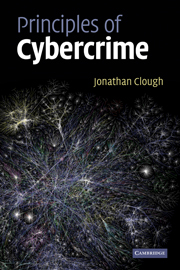Book contents
- Frontmatter
- Contents
- Preface
- Acknowledgements
- List of abbreviations
- Table of cases
- Table of legislation
- PART I Introduction
- PART II Computer as target
- PART III Fraud and related offences
- PART IV Content-related offences
- PART V Offences against the person
- 11 ‘Grooming’
- 12 Cyberstalking
- 13 Voyeurism
- PART VI Jurisdiction
- Bibliography
- Index
12 - Cyberstalking
Published online by Cambridge University Press: 05 June 2012
- Frontmatter
- Contents
- Preface
- Acknowledgements
- List of abbreviations
- Table of cases
- Table of legislation
- PART I Introduction
- PART II Computer as target
- PART III Fraud and related offences
- PART IV Content-related offences
- PART V Offences against the person
- 11 ‘Grooming’
- 12 Cyberstalking
- 13 Voyeurism
- PART VI Jurisdiction
- Bibliography
- Index
Summary
Harassment in cyberspace
The offence of stalking illustrates perfectly how rapidly technology can be adapted to criminal purposes, and even relatively new laws soon overtaken by technological developments. The first anti-stalking law was introduced as recently as 1990 in California, with other jurisdictions soon following. Yet in the intervening years technology has not only facilitated stalking-type behaviour, it has presented considerable challenges to the effectiveness of anti-stalking provisions.
The use of the term ‘stalking’ in this context is relatively recent, and ‘like shoplifting, hooliganism and vandalism, is a description rather than a legal category’. In general terms, ‘stalking’ may be described as ‘a course of conduct in which one individual inflicts on another repeated unwanted intrusions and communications, to such an extent that the victim fears for his or her safety’. It is a complex phenomenon with a range of motivations including jealously, resentment, obsession or the desire to exert control. The stalker may be known to the victim, a former partner, relative, acquaintance or a complete stranger. Although popularly associated with celebrities, stalking-type behaviour commonly occurs in the context of domestic violence. While women are more likely to be the victims of stalking, offenders are predominately male.
Stalking may take a variety of forms including following and/or keeping the victim under surveillance, repeated and harassing phone calls or other communications such as letters or emails, leaving offensive material for the victim and property damage. This conduct may continue for considerable periods of time – often months, sometimes years.
- Type
- Chapter
- Information
- Principles of Cybercrime , pp. 365 - 387Publisher: Cambridge University PressPrint publication year: 2010



